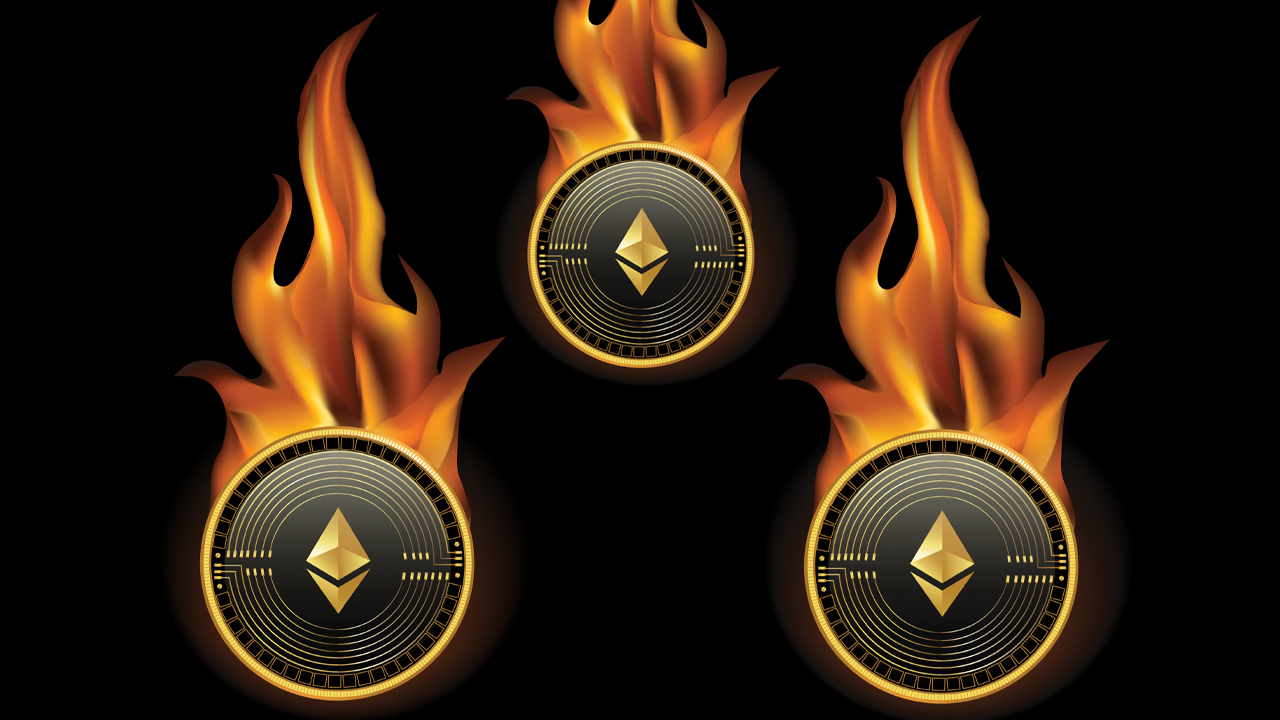
According to current metrics, the Ethereum blockchain has burned 2.35 million ether since the implementation of Ethereum Improvement Proposal (EIP) 1559. The $8.10 billion in value was burned over the course of nine months and during the last seven days, 18,110 ether worth $34.9 million was destroyed.
2.35 Million Ethereum Burned — Ethereum Dev Says The Merge Could Happen in August
Approximately 288 days ago, Ethereum developers implemented EIP 1559, a ruleset upgrade that basically changed the algorithm tied to the base fee per gas in the protocol and the network now burns the base fee per gas.
Since the August 5, 2021 London upgrade, after EIP 1559 was codified into the codebase and live, 2.35 million ether worth $8.10 billion in USD value has been destroyed forever.
The day after EIP 1559 was implemented, Ethereum co-founder Vitalik Buterin explained that the change was “definitely the most important part of [the] London [upgrade].”
During the last 24 hours, 2,396 ether worth $4.63 million has been burned. On May 1, 2022, the network saw the largest daily burn rate ever with 71,718 ether worth $138.78 million. The second highest burn rate daily record was on January 10, 2022, as 19,424 ethereum worth roughly $37.5 million was destroyed that day.
The biggest ethereum burner today is Opensea as the marketplace has burned 229,925 ether over 14,639,327 transactions. Gas used for ether transfers has burned a total of 207,072 ETH, and Uniswap V2 has burned 131,457 ether.
While the London upgrade’s EIP 1559 was a big protocol change, the next big shift will be when The Merge is applied. At that time, Ethereum will transition to a full proof-of-stake (PoS) network from its current proof-of-work (PoW) consensus algorithm.
Ethereum proponents are already getting prepared for The Merge as they suspect the change will be codified at some point this summer. Just recently, on May 17, the Ethereum-focused software firm Consensys launched an early access version of “Bonsai Tries” which aims to be a few steps ahead of the official Merge transition.
Furthermore, at the recent Permissionless conference, Ethereum developer Preston Van Loon said the public may see The Merge implemented by August. Ethereum developer Tim Beiko recently explained The Merge will likely go live by the third quarter of 2022. Beiko further explained that he “strongly suggests” that miners do not invest in more mining rigs going forward.
Despite the upcoming changes, Ethereum’s PoW hashrate has been at the highest point in the network’s lifetime on May 13, at block height 14,770,231. Burning ethereum has become simply part of the protocol and many crypto proponents believe ethereum will be ‘ultra-sound’ money with the deflationary mechanism.
A simulation of The Merge indicates that after the transition, ethereum will become scarcer. Currently, Ethereum’s issuance rate is 5.4 million ethereum a year, and after The Merge, the issuance rate will be around only 500,000 ether per year. While current supply growth is 3.7% annually, after The Merge, it will be roughly about 0.4% per year.
Amid all those changes, Ethereum’s burn rate will be the same, which is estimated to be around 900,000 ether per year. However, significant spikes like the 71,718 ether burned on May 1, can change estimations a great deal.
What do you think about the 2.35 million ether burned since August 5, 2021? How do you feel about The Merge approaching? Let us know what you think about this subject in the comments section below.
Image Credits: Shutterstock, Pixabay, Wiki Commons
Disclaimer: This article is for informational purposes only. It is not a direct offer or solicitation of an offer to buy or sell, or a recommendation or endorsement of any products, services, or companies. Bitcoin.com does not provide investment, tax, legal, or accounting advice. Neither the company nor the author is responsible, directly or indirectly, for any damage or loss caused or alleged to be caused by or in connection with the use of or reliance on any content, goods or services mentioned in this article.
This news is republished from another source. You can check the original article here



